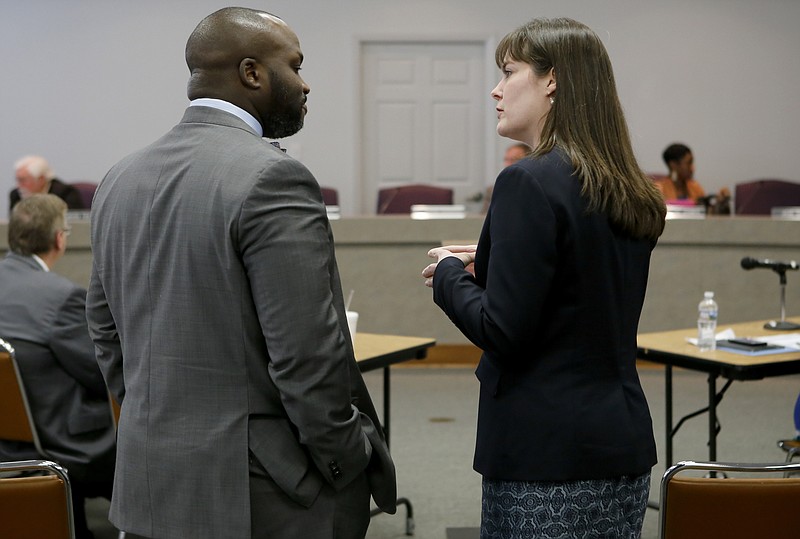It may be the 2018 version of a student calling in a bomb threat to a school.
A reported cyberattack on Questar Assessment, the vendor for Tennessee's TNReady tests, has fouled the assessments process for students, teachers and public school districts. It is the third straight year in which testing has been compromised for one reason or another.
Unfortunately, the Volunteer State was only one of at least seven states where the computerized testing process was interrupted over the past two weeks.
Before the broader attack on Minneapolis-based Questar was known, some Democrats in the Tennessee legislature were calling for Commissioner of Education Dr. Candice McQueen to be fired over the problem.
Clearly, they should look before they leap.
The assessments company has not revealed - if it knows - the cause of the problems, but the suggestion of a cyberattack leads one to suspect anyone from a teenager up to no good to an anti-government zealot who believes state-wide assessment tests are the anti-Christ could be involved.
Brad Baumgartner, the chief operating officer for Questar, told the Rochester, N.Y., Democrat & Chronicle an investigation into the problem is ongoing.
"We do know that a data pattern presented itself that was not consistent with anything we have experienced prior," he said.
Despite the attack on the vendor, McQueen appeared on Wednesday before lawmakers, who wanted accountability for their $30 million annual testing outlay. She apologized and asked for the Nashville district attorney general to call in the Tennessee Bureau of Investigation and the Office of Homeland Security to investigate.
A request was made late Wednesday for the TBI to step in, the Nashville Tennessean reported.
On Thursday, the General Assembly hurriedly struck a deal - pulling in the state budget as a hostage for a short time - to hold students, teachers and schools harmless over the test results.
Given the problems with the tests - and a Tennessee record number of 250,000 online tests were completed accurately Thursday - it was the right thing to do, but it prevents for one more year getting an accurate picture of education in the state.
Even what will be known may have to be taken with a grain of salt.
If parents and/or teachers intimated to their students, or the students heard elsewhere, that their scores wouldn't count against them, who's to say they would try as hard? They might not spend those few extra seconds on one problem and might not worry about going back to the questions they skipped for another look.
Teachers who are able to move their students' learning ahead during the first nine months of the school year won't be rewarded, and those who are unable to make progress with students or may even see them regress aren't asked to improve.
For districts and schools, it means they won't receive the A-F grades that McQueen promised - and many districts, including Hamilton County, hated - as a way of assessment.
It also means this fall's priority schools list - which is composed of the bottom 5 percent of schools across the state, based on testing data - won't include 2018 results. How that will factor in the creation of a list, or if a list will be created, is unknown.
For Hamilton County, which is in the preparation year for its previously designated priority schools to be aligned in a state/local Partnership Network hybrid, things seemingly won't change much. Since the five schools in the network also are a part of Superintendent Dr. Bryan Johnson's 12-school Opportunity Zone, the district can continue to move forward with plans that offer more flexibility for principals and teachers, improved instruction, increased accountability, innovative approaches, extended learning time, and reallocated resources, among other things, in the schools.
When Tennessee signed its contract with Questar in July 2016, the term was for two years with an option for an extension for up to five years. At the time, the state sought a vendor that had success developing statewide online assessments. Few vendors at the time had done that and even fewer successfully. Now, McQueen will have to determine if the state should continue with the company or start again with a new vendor and whatever problems that might bring. If the state does decide to change testing vendors, the new company would be the state's fourth since 2013.
Unfortunately, this week's testing snafu also will continue the drumbeat of the general anti-testing crowd, which doesn't appreciate the value of having statewide or nationwide assessments and claims any time away from classroom instruction can be ruinous.
We don't envy the decision McQueen and her team will have to make, especially with one sitting governor and six major-party would-be gubernatorial candidates looking over her shoulder and crossing their fingers they won't have to deal with the same problems 12 months from now.
